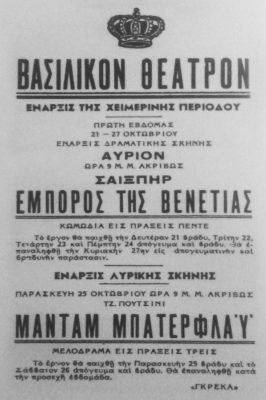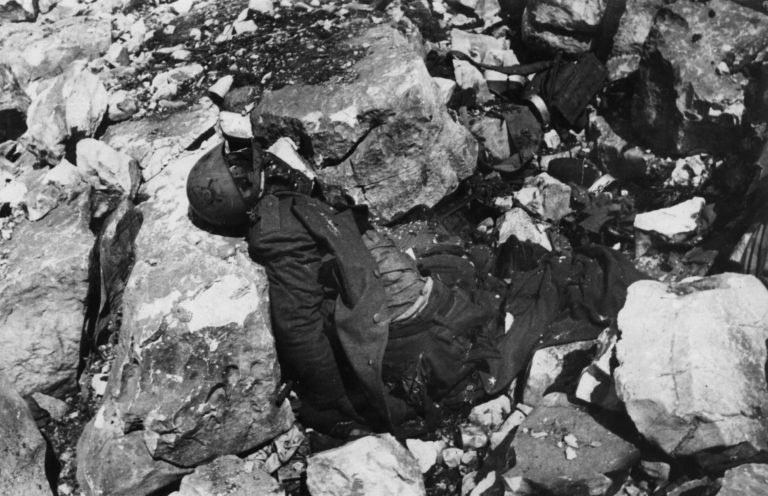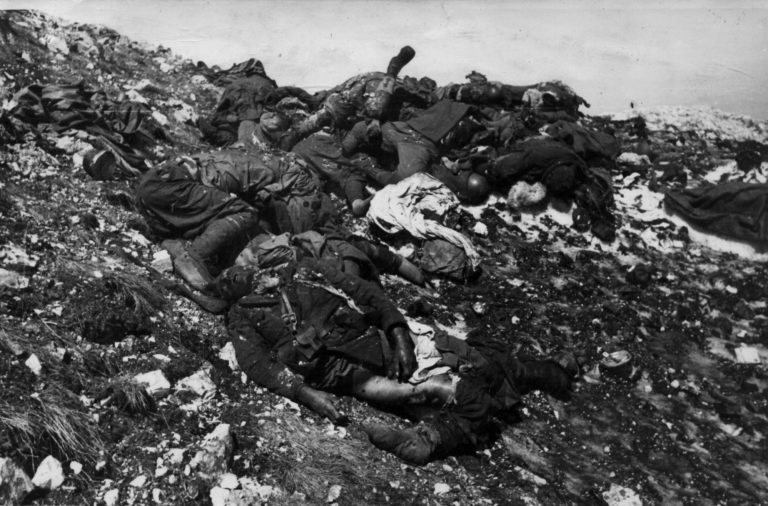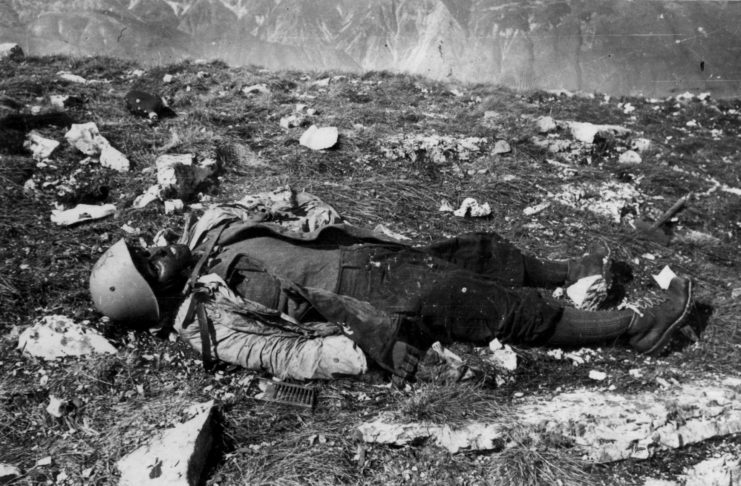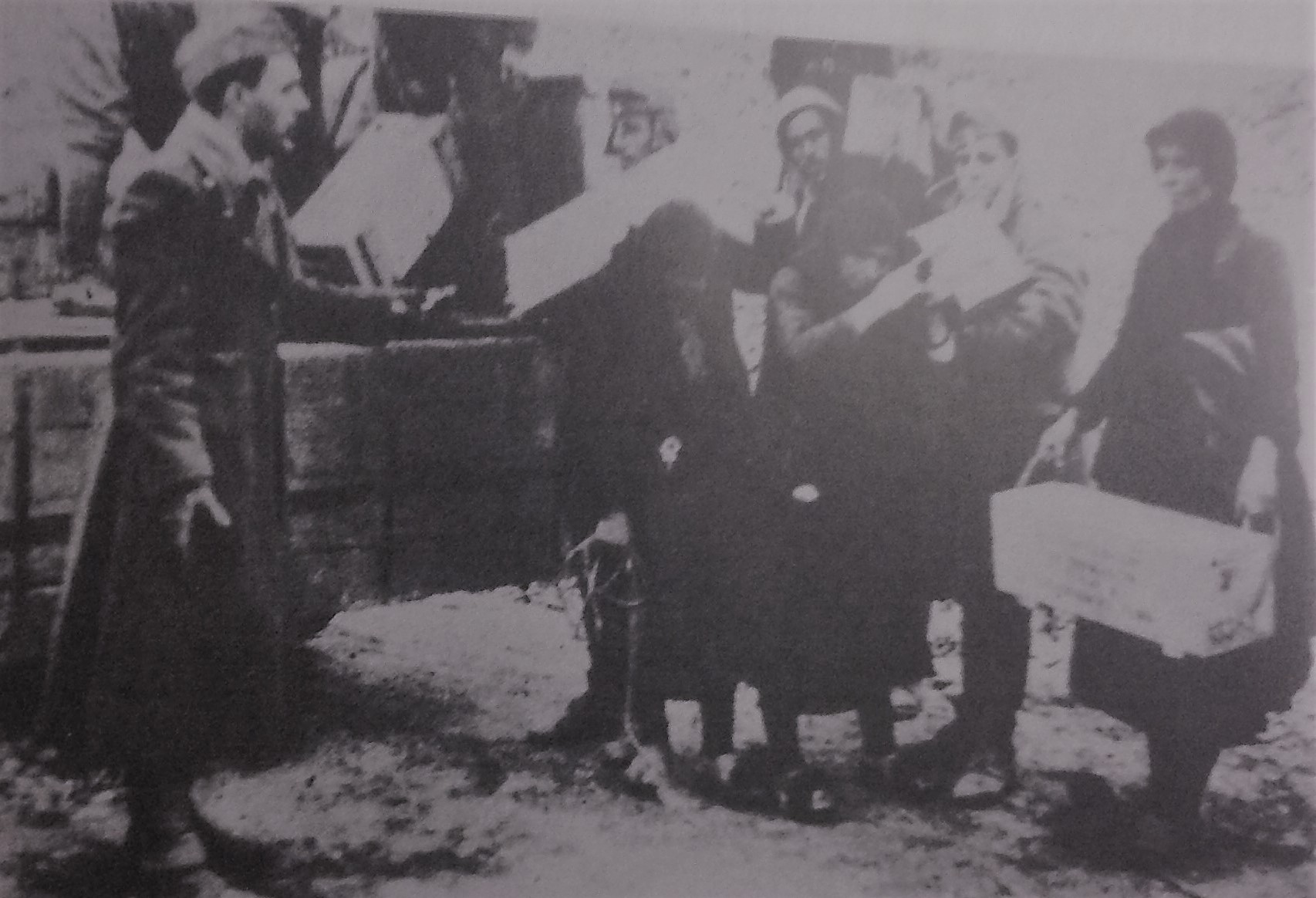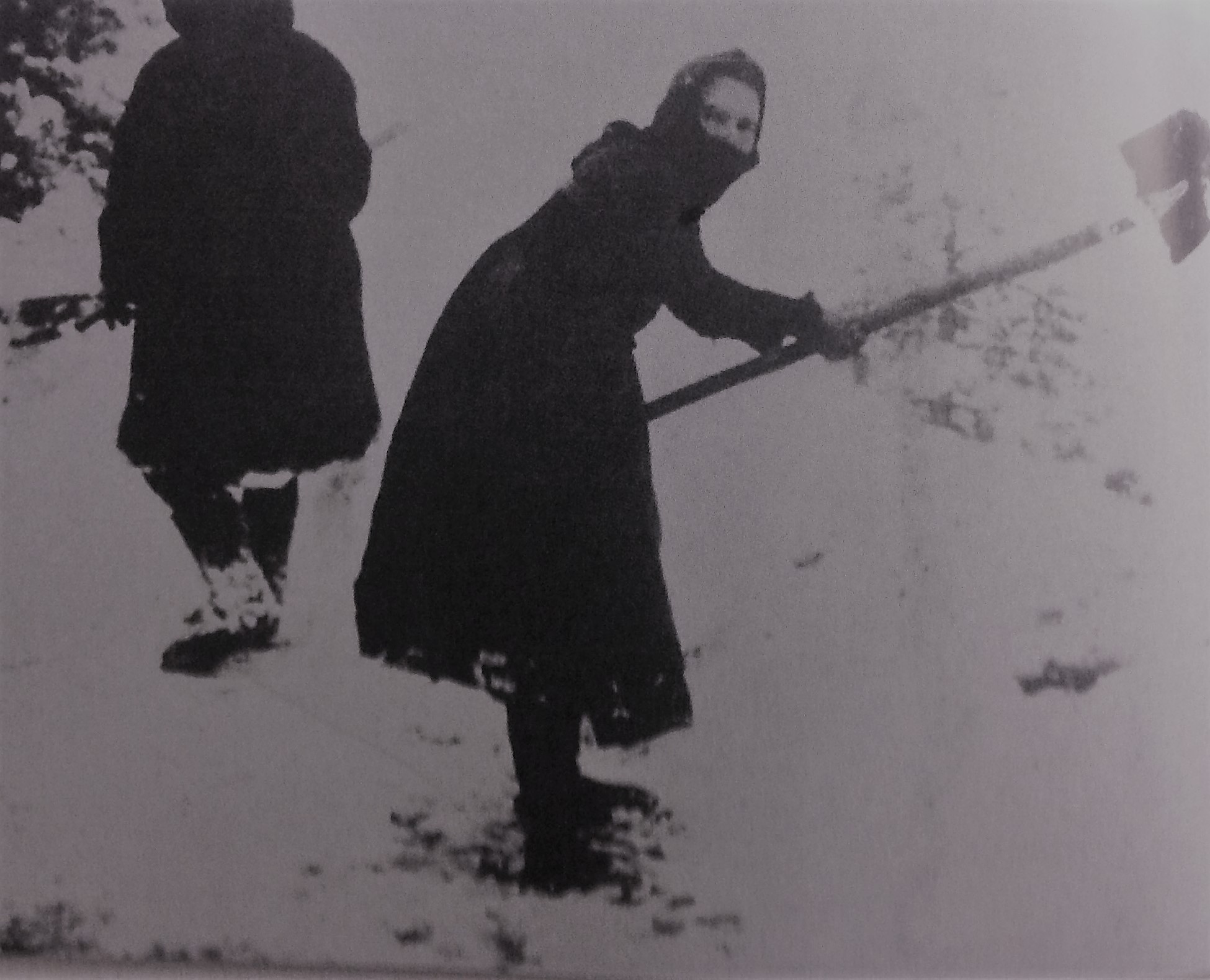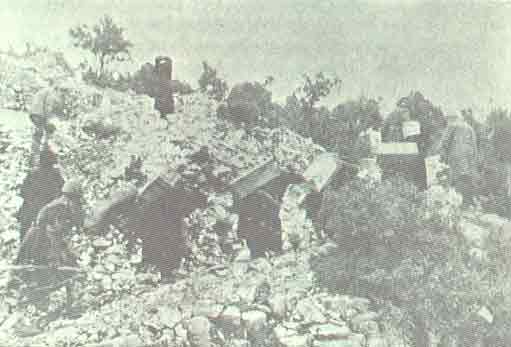Greek soldiers with mortars and carrying materiel.
Diary of private Christos N. Petrou Mesogitis, b. 1909, at East Attica, was an archaeologist. He kept a war diary from October 1940 since April 1941. Among his duties was the interrogation of the Italian POWs. As an Arvanite Greek, he could also confer with the Albanians. The war and the Axis Occupation strained his health and he died on September 19, 1944 from a heart attack, aged 35, a month before Greece’s liberation.
October 28 (Monday) 1940
«We woke up around 06:30. We heard thunders from the west, their bright was mirroring to the clouds. I believed it was a storm. The captain was outside from his tent along with second lieutenant Vaos and they were discussing that the noise was a naval battle between the British and the Italian fleets.
The noise was persisting. We took tea. Soldiers were commenting these cannon balls. A rumor was spread that war was declared between Greece and Italy! It was a shock. Nobody expected this news. Our heart froze. We couldn’t gather courage, despite our hate against Italians. Melancholy. The specter of war was in front of us, with every hardship it carries.
We wanted to hear news, but they were confused. Newspapers, even Macedonian (from Greek Macedonia), could not reach us. Soldiers were spreading rumors. They told us that we were advancing and that our artillery “imposed them silence”, according to their words. Great excitement among the soldiers. Also, a great indignation, especially when we learned about the conditions under which the Italians gave to the Greek prime minister the insolent ultimatum. We saw that the war was forced upon us and we had no other choice. We would fight.
So be it, the war has begun. We are hearing cannon balls the whole time. In short distance, right and left, are own heavy batteries, shooting. In a moment we saw enemy shells striking near our right battery, 2-3 Kilometers near us. We were not battle hardened, we were shocked and started to think how we could disperse and take cover. Our commander took time and toil to bring us back in discipline. Now I understood how sneaky weapon the artillery was!
The sky was blue, and because of their color, the airplanes were invisible. Also, sometimes they made no buzz. During the first two days they flew at average altitude, but when they realized that we had no anti-aircraft defense, they were descending up to 200-100 meters. Our machine guns from the near mountaintops started their tenacious shooting, but with no results. We anxiously waited in our ditches to see an enemy plane falling, in vain. They had so good armor that our machine-gun fire could not penetrate them.
Shocking bombardments everywhere. Bombs dig the soil and break rocks. The Italian misfire is extraordinary. They cannot find a single target. Anyone can believe that they just throw their bombs like doing a chore. But they bombed many cities in the interior and they seriously damaged them.
One thing brings me sadness. Still no letter from my home. I waited for the courier every night with eagerness, just to get disappointed from his negative answer of my question. I wrote almost every day. I didn’t care so much that I had no news from my home. I was terrified that they didn’t received any of my letters, so they couldn’t relieve from their anxiety, especially my mother, from the day the war started. The same grievance was shared by many.
The local (Greek) Macedonians have a thick accent, especially in their “s”. They are loud. They are enthusiastic and grumpy. But deep down they are not bad guys. I wasn’t fond of them at first. But later I got to know them better and got used with them. They are also fine warriors. They comprise the largest part of our division. They are happy to fight on their home ground. They feel their relatives and their lands too close.
November 14, 1940 (Thursday)
A child took me out from the village and showed me a pathway. Lot of dusty cliffs below, very deep. Machine guns from these cliffs are firing without pause. Airplanes upon my head. Dog fights. I can understand them from the sound of their engines as they are moving higher and maneuvering. A few times I can see them.
One of the planes diverged. The other was still upon us. In a glimpse, we saw from the east five fighters from our own. Three Italian fighters, escorting the bombers, left when they saw ours. Our fighters were coming straight through. The enemy bomber made a move to leave. One of our fighters left the group, came close, maneuvered and shot the bomber. In a matter of seconds, we saw the enemy bomber shacking and at the same time small white parts like papers came out of it. Smokes and a bright, and the bomber felt growling to its death. A column of thick black smoke rose from the spot of the crush. It’s impossible to describe our feelings from this sight. Applauses, joy, upheaval. Never in my life I felt such a raw satisfaction and joy. Never in my life I screamed so wild.
November 21, 1940 (Thursday)
During night the brought us 14 more Italian POW. Doctor was elsewhere, so the veterinary examined them. Among them many were Alpinists. They belonged to the Division Tzidentina, from which a regiment came last week from Brindisi to Tirana via airplanes. This information was important, as we knew for the first time that Italians where streghneting their forces through air and not through see alone. We gave them cheese and bread and they had three days to eat. After that, they were proceeded to the POW camps. Among their letters we captured, a few impressed me. In particular, some postcards sent by a wife to her husband, expressing her love in laconic manner and with very tender words. I read them and I was thinking all the misery Mussolini’s inhumane ambition caused to these tender and loving souls. I kept some of the postcards for memorabilia, like some other lads from the office. Here a few samples: “tanti pansieri cari = many loving thoughts”, “Ti voglio tanto bene, tua mogliettina = I love you so much, your little wife”, “Ti amo ogni giorno di piu, tua mogliettina = I love you more every day, your little wife”.
November 22, 1940 (Friday)
In the morning we received six more POW. 2-3 of them were only 20 years old, still children, and they impressed our soldiers, who greet the Italians. The latter were answering with the same friendly tone and everyone was happy. I interrogated them myself. All of them were infantry guys. We didn’t learn something important from them. All were cursing Mussolini, especially the younger of them, who came to fight in a war for the first time in their lives and surrendered immediately when we attacked them. Our guys are advancing without break. We heard of captured artillery pieces, machine guns, mortars and other materiel. We took Korytsa (Korçë). Weather is cloudy and cold.
November 24, 1940 (Sunday)
We are about to enter Albanian territory. The road is impassable because of the mud. Trucks, artillery, common cars and other transport means were stuck in many spots…. Everywhere are signs of the Italian presence. Boxes of Italian cans, abandoned cartridges, papers with Italian letters. In the background we can see the legendary now Morovas mountain, Moravas as we call it, tall, dark and full of ridges. How did our troops managed to capture it? Everyone who sees the mountain can immediately understand how heroic was their feat.
November 26, 1940 (Tuesday)
Before we left, I saw in the courtyard a few gears of KIA, ours and Italians. Most of them ours. I wanted mainly to get a helmet, since I don’t have. The state of all these things was poor. Many broken rifles, many helmets stained in blood, 1-2 were pierced by bullets or shrapnel… I was so saddened that I couldn’t take any helmet… I only took a gas mask, with an inward difficulty. A name was inscribed on it: Ch. Roussos.
The place was used by the Italians as HQ. It had everything, tables and wealthy chairs, boxes of any kind, bundles of papers and numerous bottles of wine and beer! The Italian officers had a great time, while our officers were more frugal, just like the common soldiers.
December 2, 1940 (Monday)
Afterwards they brought us 5 Italian prisoners. They came from Italy on November 24. One of the surrendered without a fight. They are happy to be captured and they are singing. Those lads were not for war! Our soldiers have self-concentration, like they study their moves before acting. With self confidence and prudence and resilience there are hurry, they want to end the war as quickly as possible, ready for every sacrifice. They swear and curse Mussolini without end.
December 3, 1940 (Tuesday)
The Italians are attempting to contain the situation by every mean. To prevent their troops from escaping, Italian officers stay behind the lines with revolvers and machine guns and they kill them. But all are in vain. The children of… brave Rome… if they cannot leave, they surrender. They are the same guys that wrote on the walls of the house we are staying “Di aquila penne, unge di lionessa ritorneremo” = We’ll return with eagle wings and lioness claws”. I don’t know if we should laugh with them or feel pity for them.
December 9, 1940 (Monday)
The population of this country (Albanian) is suffering greatly. No salt, no petrol, sugar and various other goods. A shortage of bread is coming. The fields, because of the war, were not cultivated entirely. Now their animals will be in danger during the winter, since they have no food. Their sheep, because of the war and the battles taking place in lower altitudes, cannot go to their places and they will day in higher altitudes.
December 16, 1940 ( Monday)
At night, according to our Lieutenant’s scheme, we performed a mock execution to the Albanian suspect. We woke him up with two sergeants and we took him in a field to compel him to confess the truth, because he insisted that he was not involved. He was shacking as he wore a woolen blanket. The poor chap was sick as well. He insisted that he told us the truth and when we placed him at the “execution spot”, he repeated in Albanian: “me marene nde qafe, rroft e Greqia! = They fucked me, long live Greece!” (not accurate translation). Immediately before the “execution”, the lieutenant came and told him that the “execution” was postponed for next day, as the prisoner was to be transported in Korytsa (Korçë).
December 20, 1940 (Friday)
We see some of our pack animals, lean and wounded. Naturally they are transported to the veterinary. For an instance they kept them on the edge of the road. One of them is eating snow, the other eats straws. I see their predicament and I commiserate the poor things from the bottom of my heart.
December 24, 1940 (Tuesday)
Raining through the whole day, at times it snows as well. Snow has become mud. The boots are wet. It’s Christmas Eve, but nobody thinks such things up there.
December 26, 1940 (Thursday)
Our lads at the observatory points are terribly suffering from the cold temperatures. They are replaced every 5-6 days. Now the observatories are working well. They took positions towards the Pogradec sector. The sound platoon has advanced the most. They were anxiously waiting news from me, because of my position related with the operations. They live secluded from any news.
December 27, 1940 (Friday)
Hellish cold today. They hardest since we came up there. Strong north wind that pierces our bones. We feel our brains dry and screwed.
January 22, 1941 (Wednesday)
The mule corps are entire caravans, crawling like snakes on the steep slopes. The mules are covered with mud, and this mud has dried up in thick clots. The tuft of their tales is a lump of mud. The muleteers are equally covered in mud and blowzy. Here, seeing those silent and deep contemplative men to moving forward with confidence in their effort, you can take a glimpse of the Greek miracle, as it manifests in this brilliant effort on the Albanian mountains, about the endurance and the capacities of the Greek race… A sad view, touching our souls, are the many bodies of the mules… without their support, our deeds would be impossible. It’s like they feel the importance of their mission as well… men and animals have the same soul, the same silent self-concentration.
February 4, 1941 (Tuesday)
I’m occupying myself with the Italian interceptions that our special station at Osnak took. I am receiving them through telephone, and I am giving them to the Corps. They are coded words. But today we had three-digit numbers, numbers that we have their key. I spent the whole night decoding them.
February 18, 1941 (Tuesday)
We learned from last night that the execution of two deserters would take place near Malik. They were sentenced a few days before from the court martial. We reached the execution place. Many soldiers were gathered. The condemned were with the priest and some others… The armed men lined up. Some officers came along with the prosecutor. The verdict was read while the armed detachments presented arms. In dead silence, the lieutenant’s voice was heard: “Dionysius, in the name of the Law I remove you from office. You are unworthy of carrying the Greek arms”, while he ripped the coat of arms and his epaulets from his uniform.
After, they asked them if they had any last wish. The first guy, Dionysius… from Zakynthos, asked to see a fellow countryman gendarme. They spoke to each other and finally they kissed each other. He did not lose his nerve. He was an easy-going dude… The other guy, named Triantafyllos, from Kastoria, looked contrite and he was almost crying. He said that he was drifted to this action by others and wished us “victory”. Both of them were married and had children. They took them to the spot, a few meters wide from each other. The execution squad took its place. They put them to kneel. They tried to blindfold them… One of them refused. He only asked the warrant officer who commanded the execution squad to write his will in two sentences.
All were ready. Dead silence. The warrant officer of the Gendarmerie commanded “Aim!”. Everyone stopped breathing. Some turned their heads away. I tried to do the same, but I controlled myself. “Fire!”. The sound of bullets piercing the bodies and then hitting the hill behind. They fall in front. After, the coup de grace. A sergeant with his revolver shot at… head’s first. He didn’t aim well and shot again. The head was blown up and he was done… Dense blood clots shrouded his face and his eyes were completely extinguished. The other had his chest perforated from the left side. His clothes were blood-soaked, even his one hand, because the time he was about to be shot, he brought his head to his chest saying “shoot freely, lads”
April 8, 1941 (Tuesday)
XIII from our left flank caught 500 POW. We also took 40 POW today while clearing the area. But only 38 came to HQ. Two Italians were summarily executed by a soldier who lost his brother the day before yesterday.
April 12, 1941 (Saturday)
The expected order of retreat came… Mourning, silent crying from our souls. We, the victors, leaving, abandoning the ground we gained with so much blood? Bloody misfortune! And where will we leave are fallen brothers? I think I can hear their own lamentation. It’s hard to write more.
May 6, 1941 (Athens)
The German airplanes are ripping the Athenian skies like barbarians, in the same manner our soul is ripped from the barbarian impudence of the conqueror. We gaze them with imperious iciness and that irritates them. The illustrious centuries and the unfading culture that flowered on this land are gazing them with contempt, the same contempt that the sacred marbles of Acropolis are gazing the swastika flag. This flag is gusted not by the thin winds or Attica, but by the whirlwind of revenge, damnation and curse.
Is anyone else surprised that the word ‘Rhodes’ hasn’t appeared in this thread yet? Rhodes was an Italian colony at the outbreak of The War, but its inhabitants were still mostly Greek. Italy conquered Rhodes from Turkey in 1912, and it won formal recognition in the Treaty of Lausanne in 1924. I believe The Great War Youtube channel has covered both of these events now. When the Italians were switching sides there in 1943, the Germans invaded it.
What struck me as fascinating when I visited Rhodes was how many of the surviving fortifications look so Medieval even though they were not.
A Greek muleteer.
Albanian front 1941. Greek soldiers, crew of a Reihnmetall Flak18 of 37mm anti-aircraft gun.
Albanian Front, April 1941. This light tank (Italian CV-33) had originally fallen into the possession of Greek soldiers as a loot for war. It was baptized by “THE AVENGER OF ELLI”. After the Greek army withdrew from the Albanian front due to the German invasion, it was abandoned in the area of Pogradec.
Mordechai Frizis, the highest ranking officer KIA in the Greco-Italian War.
He was a Greek Jew, born in Chalcis in 1893. He always wanted to follow a military career and in 1916 he took exams to enter in the Military Academy of Greece, but he ultimately did not study there. Two scenarios exist: 1st He was rejected because he was a Jew, 2nd He was ashamed that he did not come first in the exams.
Nevertheless he entered the school of Reserve Officers and fought in the Macedonian Front of WW1, in the Allied Intervention in Ukraine and in the Greco-Turkish War. He was captured in Smyrna. As he was a Jew (and money were gathered by the Jewish community of Greece for his release), the Turks let him leave, but he refused and remained in captivity for 11 months. After the war he became a captain and was sent to Paris to study at École Militaire. He returned as a Major and was transferred to Crete, were he became the head of censorship. He was accused that he was not good at this job and was sent to Epirus, as Lieutenant Colonel in the 8th Division.
As was planned, the 8th Division took the first hit of the Italian invasion. His unit, with the task of covering Aoös river, took the first Italian POWs of the war (700) and liberated Konitsa. After this feat, he was promoted to Colonel.
On December 5, near Përmet, his men were attacked by Italian airplanes. He ordered his men to enter in their trenches, and remained on his horse trying to keep the morale of his troops. Thus he was machine-gunned by an Italian plane. The Greek-Orthodox chaplain of his unit, closed his eyes chanting the Jewish prayer Shema Yisrael: “Hear, O Israel: the Lord our God, the Lord is one”
During the Axis Occupation, Greek members of the German administration of Thessaloniki issued false papers for his family, which escaped the Holocaust. In 2002, his corpse was found in Albania and was reburied in Thessaloniki. Today, many streets in Greece are named after him, and many statues and busts of him exist.
Holy shit, didn’t notice that!
“Friday, October 25, 1940, 21:00, Madam Butterfly premiers at the Royal Theatre”
The Italian embassy in Athens, being ordered by Mussolini, called Antonio Puccini, Giacomo Puccini’s son, for the play of Madan Butterfly in the Royal Theatre of Athens, as an opportunity to warm up the relations between the two countries.
The Italian ambassador to Greece, count Emanuele Grazzi, had organized a large reception in honor of Puccini’s son in the embassy building, attended by the Athenian high society. At the same time, the coded telegram of the Italian ultimatum was transmitted. For not raising suspicions, Grazzi ordered his decoding staff to break off the decoding from time to time and conferring with the guests. At the first hours of October 28, the ultimatum was decoded and the Italian ambassador headed at 03:00 to Metaxas’ home.
Ultimatum given from the Italian ambassador to the Prime Minister and Foreign Secretary at 03:00, on October 28, 1940.
The Italian Government was continuously forced to ascertain that, during the course of the present conflict, the Greek government adopted and maintained a stance that is contrary not only to the normal bilateral relations of peace and neighborhood, but also towards the duties set and consequent for the Greek government, as a neutral state
The Italian Government repeatedly came in need to recall the Greek Government to fulfill her duties and protest against the systematic violation of them, violation that is particularly serious, given the fact that the Greek Government accepted that the British fleet could use her territorial waters, her shores and her ports during the war operations, she favored the refueling of British Air Forces, she allowed the organization of a military intelligence service against Italy in her archipelago.
The Greek government is fully aware of those facts, that have been the object of a diplomatic overtures, and towards them the Greek Government – who should be aware of the serious consequences of her stance – did not answer by taking no measure to protect her neutrality, but, on the contrary, by the intensity of her action towards the reinforcement of British Armed Forces and her cooperation with the enemies of Italy.
The Italian Government has evidences that this cooperation was provided for and settled by the Greek Government, even so through militarily, maritime and aviation nature. The Italian Government is not only referring to the British guarantee that Greece accepted as part of a move against the security of Italy, but also from the explicit and definite obligations, undertook by the Greek Government, as she place at the disposal of Powers in war against Italy great strategic position inside Greek territory, including airfields in Thessaly and Macedonia, destined to attack Albanian territory.
The Italian Government rightly reminds the Greek Government accordingly the provocative acts made against the Albanian nation by the terrorist policy adopted against the population of Chameria and by the vigorous efforts to create anomalies across her border. And by this fact the Italian Government found herself in need to remind the Greek Government, in vain, the unavoidable consequences of this similar policy according to Italy.
Italy cannot accept all these anymore. The neutrality of Greece was becoming more and more ostensible.
The responsibility for this situation firstly rests on England and her intension for always perplexing other countries into the war.
For the Italian Government it is obvious that the policy of the Greek Government tended and tends to transform the Greek territory, or allow it to transform, at least, as a war base against Italy. This could lead to an armed conflict between Italy and Greece, a breach that the Italian Government has every intention to avoid.
Therefore, the Italian Government decided to ask from the Greek Government – as a guarantee for the neutrality of Greece and as guarantee for the safety of Italy – the right to occupy by her armed forces, for the duration of the present rupture with England, certain strategic points of Greek territory. The Italian Government asks from the Greek Government not to oppose this capture and to not obstruct the free transit of the troops predefined to carry it out. Those forces are not presented as enemies of the Greek people and the Italian Government has no intention, by the temporary occupation of those strategic points imposed by the need of the circumstances and having strictly defensive character, to offend at any way the sovereignty and the independence of Greece.
The Italian Government asks from the Greek Government to give immediately the necessary orders to the military authorities for this occupation to be realized peacefully. If the Italian troops meet resistance, this resistance will be broken by arms and the Greek Government would carry any responsibility.
Metaxas declaration to the Greek people, October 28, 1940.
The time to fight for Greece’s independence, territorial integrity and honor has arrived. Despite keeping the most strict neutrality, equal to every side, Italy, not recognizing us the right to live as free Greeks, asked me today at 03:00 to surrender parts of sovereign territory according to her own will, and announced me that, for acquiring those parts, the movement of her troops would start at 06:00. I have answered to the Italian ambassador that I believe the demand itself, and the way of its delivery, was an Italian declaration of war against Greece.
Now we will prove if we are actually worthy of our ancestors and of the freedom secured by our forefathers. The entire nation will rise as one body.
“Fight for your Fatherland, for your women, for your children and our holy traditions.
Now is the struggle for everything” *
- The war cry of the Greeks during the Battle of Salamis (480 BC). Verses 401–405 of Aeschylus play “The Persians”. Aeschylus was a veteran of that battle.
Winston Churchill to Prime Minister and Foreign Minister of Greece, Ioannis Metaxas.
London, October 28, 1940.
(from a Greek translation)
Italy’s threats and intimidation efforts were proved fruitless before your calm courage. That’s the reason Italy resorted to this unprovoked attack against your nation, seeking to justify this shameless act at baseless accusations. The way Greek people faced the dangers and the provocations of the last months, under your worthy leadership, caused the admiration of British people for Greece. The great virtues of the Greek people will support them during the present trial. We will provide you every possible assistance, we will fight with you against the common enemy and we will share our common victory.
George VI of United Kingdom to George II, King of the Greeks
London, October 28, 1940
(from a Greek translation)
We are with you. Your cause is our cause. We will fight against the enemy. We will come through great tribulations, but the final victory is secured thanks to the contribution of all free peoples. Long live Greece and her leaders. Long live the Greek people.
Armeno Mattioli (1920-2010) an Italian painter and photographer from Florence, found himself serving in Albania during the Greco-Italian War. Despite censorship, he manage to photograph and save films depicting the horrors of the war, mainly fallen soldiers.
After the fall of Greece, he was transported in Athens. There he painted Athenian landscapes, mingled with Athenian artists, actors and cinematographers and he fell in love. After the surrender of Italy, he managed to remain in Greece, and got married. After the Greek junta of 1967 he left for Florence, and returned after the fall of dictatorship in 1974. Until the end of his life he painted Greek landscapes, mainly from the Aegean islands.
The women of Pindus
Especially during the first days of the war, and later on, the women of Pindus mountain covered the lack of motorized and mechanized means of the Greek Army, carrying out many aspects of the army’s logistics, clearing roads from snow and bringing their own provisions (mostly food and clothing) to the Greek soldiers.
The Pittsburgh Press (October 31, 1940)
HERE’S HOW TO SAY GREEK WORD FOR IT
Washington, Oct. 31 (UP) –
Here is how Library of Congress linguists pronounce names of Greek towns and islands featured in the war news:
Breznica – Brez-nit-sa (of Slavic origin)
Patras – Paa-traas’
Aegina – Ee-ge’-naa
Lerina – Lur’-ina
Corfu – Kor-foo’
Kastoria – Kas-tojari-aa
Korca – Korkah’
Jonari – Joe-naa’-ree
Athens – Ath’-enz
Kephallonia – Kif’-o-lo-ni-aa
Krete – Kreet’
Ionnina – Yo-an-een’-a
Khio – Kee’yos
Salonika – Sal’-o-nee’-ka
They did a mistake, though, Lerina is the Slavic form. The official name is Florina
Hey, don’t shoot the messenger. 
The Pittsburgh Press (November 1, 1940)
TURKEY SHUNS AID FOR GREECE
Ankara, Turkey, Nov. 1 (UP) –
President Gen. İsmet İnönü told the Turkish National Assembly today that Turkey would not now enter the war and that her territory, seas and skies would be forbidden to any belligerent.
In his address, however, he referred to Great Britain as an ally and Greece as a friend.
General İnönü said that Turkish relations with Russia were excellent and he said that Turkey would have to re-examine her entire situation in the light of extension of the war to the Balkans.
President İnönü said that:
At a time when England carries on an heroic struggle for its existence under difficult conditions it is my duty to proclaim that the bonds of alliance which unite us to her are solid and unbreakable.
To Defend Motherland
He said that the war might “extend beyond the confines of Europe and assume the proportions of a worldwide conflagration” and he asserted that Turkey was determined to defend the motherland.
General İnönü said:
Our neighbor and friend Greece, whose territory lies in that zone whose security and tranquility are of primary importance to us, finds herself forced to enter the war.
Together with our ally Great Britain, we now are carefully studying and envisaging the resulting situation.
20 Years With Russia
Our relations with the Soviet Union, which have a past of nearly 20 years, after experiencing difficulties for which neither party is responsible, have returned to normal friendship, which I note with satisfaction.
Our attitude of non-belligerence need not constitute an obstacle to normal relations with all other countries which show the same good will.
Six regimental flags of the Metaxas Line in their condition after the German invasion, on a parade, March 25, 1947
- Greek signallers on the Albanian Front. (War Museum of Greece).
Albanian front 1941. Greek Gun crew
Albanian front 1940-41. Greek officers at snowfall. (War Museum of Greece.)
Source: FB page “Greece at WWII Archives” (https://www.facebook.com/GreeceAtWw2Photostory/)
Albanian front 1940-41. Greek officers in snowy landscape.

Autumn 1940. Greek soldiers march to the Albanian front.

Albanian front 1941. Greek soldiers supply machine-gun strip cartridges.

Albanian front 1940-41. Greek soldiers on Albanian mountains-(War Museum)

Italian soldiers, prisoners of the Greek army from the Albanian front, guarded by Greek City Police, in Athens in 1941.- ASSOCIATED PRESS

Albanian front 1940-41. Greek soldiers write letters to their homes in moments of rest.

Albanian front 1940. Greek soldiers photographed with a captured Italian light tank CV-33/35

Poptisti,Albania, 1940. Awarding of medals to Greek soldiers by Crown Prince Paul of Greece.

Albanian front 1941 . A Greek soldier pauses to write a letter at home.












